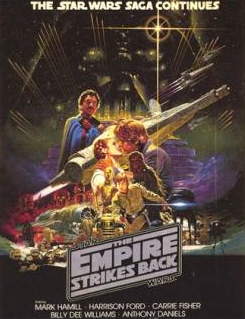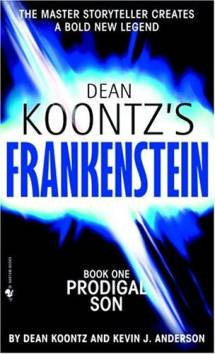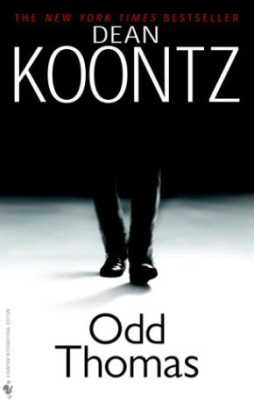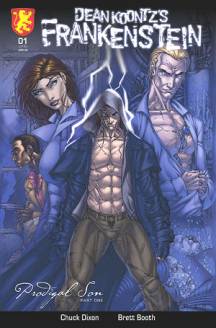Goth Chick News: You Really Need to Tell Me Everything… Now
 I’m about to cross into some sacred territory here, but what the heck.
I’m about to cross into some sacred territory here, but what the heck.
I really didn’t like The Empire Strikes Back, originally the second (ultimately fifth) in the Star Wars series. In fact, it pretty much put me off the rest of the movies and though I doggedly attended each and every one, the shine went off at number two.
Why?
Because the story left me hanging.
Yep, that’s basically it. The fact that we had to — nay, were forced to — come back for number three to find out what became of Han Solo, who was frozen in carbonite and being rocketed toward certain doom at the end of Empire, sucked the life out of the entire experience for me. Darth Vader’s evil pales in comparison to a cheap trick like an unfinished storyline.
Now before you start peppering me with email and comments about how George Lucas is a national treasure and “how dare I” and all that, please hear me out.
I know a lot of you will say that being left in suspense is part of the fun, and that if a tale is too rich to be told in under three hours it deserves to be broken up into segments. In the case of an HBO series or daytime soap operas I completely agree; waiting to see what happens tomorrow or next week is indeed the hook that keeps the viewers coming back, me included (i.e. True Blood).
The big difference is, the individual segments were never conceived or written to stand alone. And perhaps this is the argument one could make about George Lucas and his intentions when he wrote the entire Star Wars epic. However, a little cynical part of me can’t help but wonder if it had something to do with money, and that’s the bit that ever so slightly gets under my skin.
 Let’s get off Star Wars as the example, before someone crawls into their computer monitor and virtually slaps me. I’m not selective in my dislike for this tactic. It irritates me in books as well.
Let’s get off Star Wars as the example, before someone crawls into their computer monitor and virtually slaps me. I’m not selective in my dislike for this tactic. It irritates me in books as well.
This week I finally got around to picking up a book that has caught my eye on the shelf off and on for some time. Dean Koontz’s Frankenstein immediately piqued my interest with the title alone and though it was originally published in 2005, I just wasn’t sure I wanted someone messing around with one of my most beloved horror stories.
Finally, after handling a copy for about the twentieth time at my local bookseller, I gave in and brought it home.
I must say I was immediately intrigued by the new twist on the well-known tale. “The Monster,” known as Deucalion has lived over two-hundred years and resides peacefully in the present day, in a Himalayan monetary. That is until a letter arrives from New Orleans (this just gets better and better) bearing a newspaper clipping proving that his creator, Victor Frankenstein, is also still alive.
Victor is a filthy rich philanthropist who heads up a massive medical research company credited with amazing breakthroughs, including we learn, prolonging his own life.
Meanwhile, in New Orleans, police detective Carson is dealing with a serial killer who seems to be collecting body parts and she’s also just stumbled across a corpse with two hearts. There’s just no way this is going to lead anywhere good.
The deeper I went into the story, the more invested I became in Deucalion as the tragic hero, and Carson as method by which the puzzle began to unravel. The tale paid attention to detail, was tightly woven, and made interesting and thoughtful references to the morality tale that was Mary Shelly’s original work. I happily followed Dean Koontz where he was leading.
 And then the unthinkable happened.
And then the unthinkable happened.
With main characters left in perilous scenarios, a killer still running amok in New Orleans and Victor Frankenstein still maneuvering the human race toward its final destruction, I turned the last page of the book. There I saw:
Read Dean Koontz’s Frankenstein, City of Night – Coming Soon!
Are you kidding me?
Granted, I knew Frankenstein was a series when I picked it up. The cover clearly said “Book One,” which would normally cause me to immediately opt out.
However Dean Koontz had proven he knows better than to irritate me by giving me several fun and completely standalone stories featuring his recurring hero Odd Thomas.
What I was hoping for here was something similar; self-contained stories built on common characters. And what better character to follow than a nearly immortal monster?
What I didn’t expect, but probably should have, was a “stay tuned next week” dead stop that left every question unanswered and every situation unresolved.
To me that’s a cheesy thing to do to someone who has just followed you around for 496 pages.

I feel Dean Koontz is prodding me in the small of the back with a sharp stick toward his shelf in the bookstore, attempting to use my need for closure to force me into purchasing the next book; the stick I think he borrowed from George Lucas.
There are now five books in the Frankenstein series, which has also been turned into a comic. This is a much more fitting format from which to be asked to hang around for the next installment and from what I’ve seen, they look very interesting. The comics are where I’ll go next, but not back to the books.
And before you call me a hypocrite, yes, I did rush out to see the “first installment” of the final Harry Potter movie and loved every second of it.
The difference is that nearly everyone who waded into the crowds on opening weekend knows full well what’s going to happen since we’ve all read the books (which, by the way, all stood very well on their own as complete stories while still connecting to one another).
Not to mention that we’ve known for months that this last book would be made into two movies. So thankfully I didn’t leave the theater with a “WTF?” feeling… not much, anyway.
 I did feel a bit like going fetal at the point when the Deathly Hallows, Part One started rolling its credits. But I held it back.
I did feel a bit like going fetal at the point when the Deathly Hallows, Part One started rolling its credits. But I held it back.
I am a storyteller’s most willing and eager audience member, who will follow unquestioningly into hundreds of pages or hours of film. Tell me a good tale and I’ll go with you wherever you lead.
Just please, whatever you do, don’t take advantage of my lemming-like loyalty and lead me over the edge of a cliff.
So what do you think? Do you like a “to be continued” ending or does it make you want to do violence? Post a comment or drop me a line at Sue@blackgate.com.
Happy Thanksgiving!
Goth Chicks know nothing of the power of the Force… or the Empire it seems 🙂
Perhaps not, but we do know about voodoo and icky things in mason jars…
I think you’re exactly right, Sue! A book should give you some kind of ending, some sense of finality, even if it’s part of a multi-volume saga. This is a big topic right now–there was a panel at the WFC about Epic Fantasy where we talked about just this things. Turns out that thick books aren’t as profitable as they used to be, so many publishers are asking (making) authors break their books into two (or three) volumes. For a story that wasn’t MEANT to be broken up, you can get that frustrated feeling…and unlike comics you can’t simply pick up next month’s issue. Sometimes you’re waiting a year or two or three before the next volume comes out.
I think most authors want to give a sense of finality–even if it’s a minor conclusion–at the end of each volume. However, it may be that their editors/publishers have said “We have to break this up.” Sounds like that was the case with Koontz’s FRANKENSTEIN (I don’t know that for a fact, I’m just saying).
Comics writers are really good about giving mini-conclusions that are part of a greater story arc; whereas the average novel writer may not be. I know that writing comics and studying the format has given me a certain awareness of that. I call it the “bang for your buck” syndrome…give the reader a complete story in ever unit of product, whether it’s an issue, a volume, or a movie.
I actually never considered it was the blood-sucking editors forcing writers to break their creations up into little bite sized bits. Extremely good points that make me feel a little less curmudgeon-y and a little more like looking up Blackgate editor John O’Neill and having a bit of a chat…
Thanks for the insight!
Sue: Well, voodoo and icky things are pretty awesome too!
I disagree that every “book” or movie has to tell a “complete” story.
To be frank, I think that idea is fairly ridiculous. Some stories take more time to tell than others.
I do think that if that is the case the author and publishers (or in the case of movies directors and studios) need to be up front that the product is but one part of many.
On the other hand, something that does tick me off is when a book/movie tells a “complete” story then tacks on a teaser for a continuation in the final chapter/epilogue. That makes me think it is all done simply for the money.
Something I wonder about the “every book must be a complete story” crowd, is with e-books and e-pub coming does every story have to be a set length? Would something that could never be published as a “single book” be acceptable?
In other words, would a multi-million word “story” published as a single title be acceptable? And if so, why is that acceptable and that same story chopped up into 10 separate “titles” not be?
As to Empire Strikes Back, I am pretty sure I remember back in 1980 it was abundantly clear that the story was going to continue on into a third movie.
but you read Dean R Koontz??? I thought you have better likes
I definitely have better likes, but yes, I occassionally read Dean Kootz. This job isn’t all fun and games you know.
Nice one… you insult the man’s movie and he’s dead four days later… how very Goth of you 🙂
Ok, that was brutal, even for me:
Star Wars Director Irvin Kershner Dies At 87
Irvin Kershner, who directed “Star Wars: The Empire Strikes Back” in 1980, has died at age 87.
No details surrounding his passing have been released, only that it was the result of a long illness.
Kershner, who taught George Lucas as the University of Southern California, was asked to helm the Star Wars sequel by Lucas after the experience directing “Star Wars: A New Hope” proved to be too stressful an encounter for Lucas. By this time, Kershner already was a seasoned director who Lucas admired greatly.
“Of all the younger guys around, all the hot shots, why me?” he apparently asked Lucas. “I remember he said, ‘Well, because you know everything a Hollywood director is supposed to know, but you’re not Hollywood.’ I liked that.”
During production, Kershner focused on providing more depth to the characters that Lucas created, and even went on to have a sharp disagreement with him over dialogue of Han Solo (Harrison Ford) in the pivotal carbon-freezing scene.
In the original script, Solo was to reply to Princess Leia’s (Carrie Fisher) “I love you,” with “I love you, too.” However, not seeing this as something that a smuggler like Solo would say, Kershner insisted that it be changed to “I know.”
According to his son, David, Kershner — lovingly known as “Kersh” to his friends — never retired from the business and was unable to quell the desire to create.
“He had a powerful drive to create, whether it be through film, photography, or writing,” David Kershner said. “At the time of his death, he was co-writing a Broadway musical entitled ‘Djinn’ and working on a documentary about his friend Ray Bradbury.”
Speaking off his death, Bradbury said Kershner “was an amazing man, a good friend, and I loved him with all my heart.”
Following “Empire Strikes Back,” Kershner would direct episodes of “Amazing Stories” and “SeaQuest 2032” among other projects. His last director job was the “SeaQuest” episode “To Be or Not to Be” in 1993.